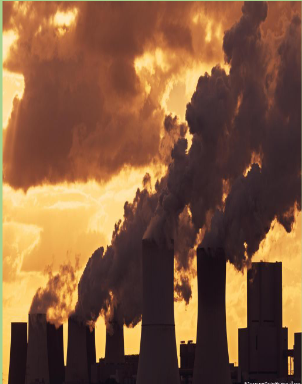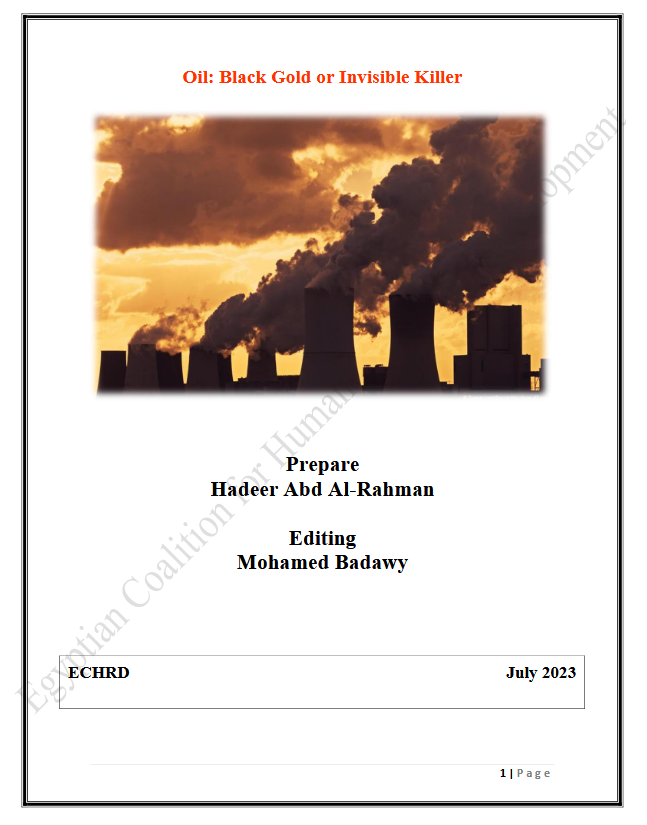Press Release
………………………………………………………….
Today, Thursday, 27/7/2023, the Egyptian Coalition for Human Rights and Development issues its report “Oil: Black Gold or the Invisible Killer”, which discusses the relationship between oil and human rights in an attempt to understand the harms of the first party on the second and how the second party can take crisis measures to reduce these damages. Through the following axes:
- First: What oil is and its uses.
- Second: the damage of oil to the environment and human rights in general. This section will be divided into three parts based on the stages of oil extraction and use as follows:
- Negative effects when drilling for oil extraction and production.
- Negative effects of oil transportation.
- Negative effects of oil use.
- Third: Addressing oil damage.
- Fourth: How to protect human rights in the presence of oil.
- Fifth: Egypt’s efforts to reduce oil risks.
Despite the importance of fossil fuels in general and oil in particular as basic drivers of all life activities such as transportation, industry and even agriculture, this importance emerges when countries are keen to ensure sufficient stocks of oil in the ground for future generations. The damage caused to humans as a result of the use of oil is countless. So, the whole world tend to search for other alternative sources of oil that achieve the quality of human life and preserve their rights on the one hand, and on the other hand, reassurance of the existence of non-mortal renewable energy sources for future generations.
The damage caused to citizens and the population as a result of oil is represented in all stages of oil extraction, refining, transportation and then use, as these damages range from all forms of pollution, displacement and forced labor to extract oil. Moreover, the damage has shifted to the political side, as the growth of oil wealth in many developing countries has fueled the ability of governments to invest in armaments, participate in the construction of buildings for prestige rather than benefit.
The use of oil as an energy source mostly involves combustion, burning petroleum products emits greenhouse gases such as carbon dioxide, methane, hydrofluorocarbons and many others.
These gases pollute the environment because they have the ability to absorb infrared radiation emitted from the surface of the earth, which contributes to global warming. Oil can also pollute water and significantly affect marine life, as it is a basic science that oil is less dense than water; and then floats on water.
Emissions from oil and gas production combined totaled 5.227 million tons of carbon dioxide equivalent in 2017. This equates to about 15% of the total energy sector emissions from combustion. More than half of emissions during oil and gas production (57%) are from deliberate venting of methane and preventable fugitive emissions.
According to the International Energy Agency, total water withdrawals for oil and gas production globally amounted to 8 billion cubic meters and 2 billion cubic meters respectively in 2014.
Oil and gas exploration and extraction requires land-use change and requires oil and gas companies to acquire land. Therefore, Changes in access to farmland or pasture and the displacement of families can lead to human rights violations.
In addition, Spills caused by deliberate and accidental damage to pipelines, as well as poor maintenance, are an important cause of groundwater and surface water pollution in Nigeria. In the United States, there are about 300 large pipeline spillage per year, due to damage, improper operation and corrosion, discharging about 104,000 tons per year in total. Oil spills account for 12% of the oil entering the ocean (the rest comes from shipping, sinks and deliberate dumping). Despite modern technologies, there will always be a risk associated with oil and gas extraction. Proof of this is that there were more than 9,000 oil spills from pipelines alone between 1986 and 2016 in the United States.
Most emissions of greenhouse gas from oil and gas when they are combusted to generate electricity produce heat or transmit energy. Emissions from the consumption of petroleum products can vary greatly: LPG emits about 360 kilograms of carbon dioxide, while heavy fuel oil emits about 440 kilograms of carbon dioxide.
The global average of the range of petroleum products produced from an equivalent barrel of crude oil in 2018 produces about 405 kilograms of carbon dioxide when combustion. The oil and gas industry was directly and indirectly responsible for more than 40% of global greenhouse gas emissions in 2017. Thus, oil and gas are the main drivers of climate change.








